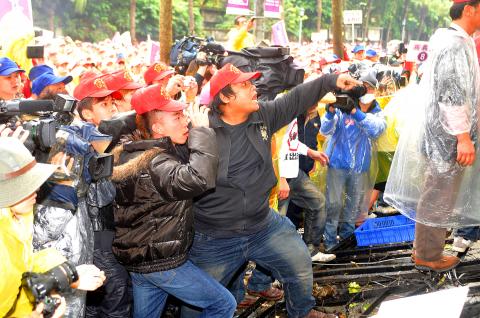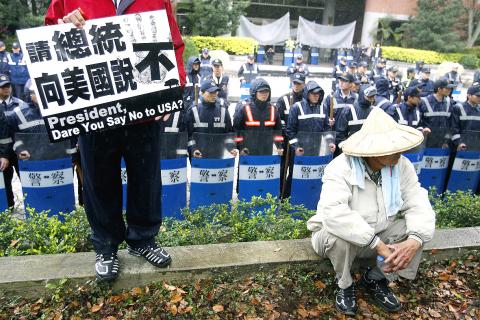Angry over the government’s plan to conditionally lift an import ban on US beef containing ractopamine residues, thousands of pig farmers converged in Taipei yesterday and pelted the Council of Agriculture building with eggs and pig excrement, as some clashed with the police deployed outside the government complex.
Many of the protesting farmers chanted anti-US beef slogans and held English-language placards that read: “President, dare you say no to USA?”
The Executive Yuan announced on Monday night that it plans to lift a ban on US beef containing traces of ractopamine, a lean-meat additive. Pig farmers fear that lifting the ban could spark widespread health concerns that would affect consumption of other meat products and undermine their livelihoods.

Photo: CNA
As the farmers gathered in front of the Legislative Yuan yesterday morning before the march, a number of lawmakers arrived and expressed their support.
Democratic Progressive Party (DPP) Legislator Gao Jyh-peng (高志鵬) said that DPP and Taiwan Solidarity Union lawmakers are against meat containing ractopamine. People First Party caucus convener Thomas Lee (李桐豪) and Chinese Nationalist Party (KMT) Legislator Yang Li-huan (楊麗環) also showed up to voice their support.
Pan Lien-chou (潘連周), spokesman for the Republic of China Swine Association, said President Ma Ying-jeou’s (馬英九) administration had been “fooling around, concealing the truth, suddenly changing its policy” and “forcing people to pray for their own fortune.”

Photo: Reuters
A hog farmer surnamed Chang (張) from Changhua County said that domestic farmers were “strict” and “never allowed to use ractopamine, but now the government is forcing us to accept meat with ractopamine residues, and we cannot allow it.”
“We are not against US beef or the TIFA [Trade and Investment Framework Agreement]. We farmers are not against economic growth, but we are against sacrificing our health,” he added. “However, the government has not presented any supplementary measures to the policy. What if it is proved that ractopamine residues do harm human health?”
“The prices of pigs have dropped rapidly since the public does not have faith in the quality of pork products now,” said another hog farmer, surnamed Lu (呂).
While it costs about NT$6,200 to NT$6,500 to raise a large pig, the price has dropped to below NT$6,000 in the past month.
“We are losing money on each pig we raise,” Lu said.
Police declined to estimate the size of the protest, but organizers put the number at about 10,000 participants.
Hsu Kuei-sen (許桂森), head of the council’s husbandry division, met the protesters and invited the directors of the national and local associations into the building for negotiations. However, one of the protest leaders and an association director, Yang Guan-chang (楊冠章), said they only wanted to meet with Council of Agriculture Minister Chen Bao-ji (陳保基).
Chen came out about two hours later and invited the representatives into the offices.
After more than an hour of negotiations, the council and the farmers reached a consensus on the five demands.
First, the council agreed to maintain its inspection standards of zero levels of ractopamine residue before the legislature makes any amendment to the Act Governing Food Sanitation (食品衛生管理法) and that it would strengthen inspections, as well as impose heavier penalties on violations.
Second, the council would negotiate with state-owned Taiwan Sugar Corp (台糖) to delay the release of its pig supply to the market and freeze excess supply of meat products.
Third, the council agreed to the farmers’ demand for the enforcement of the “95 mechanism” (a government guarantee to buy agricultural products at 95 percent of their production cost when market prices fall below a certain level).
The council also agreed to their fourth and fifth demands, to increase the agricultural budget and “not to hold the next technical advisory committee meeting before the legislature amends the Food Sanitation Management Law.”
After the rally ended, a farmer surnamed Fang (方) from Taitung County said: “I took a bus at 1am in the morning just because I cannot tolerate it anymore ... but I am only half satisfied with the result of today’s rally, because the legislature is still a barrier.”
“We should not jeopardize the health of our children, so we are against ractopamine residues in pork and beef,” Fang said. “We’ve seen pigs that eat feed containing ractopamine. The pigs’ muscles became like that of Mr Fitness and they could hardly support their own weight ... It was really strange and we can’t let people eat that.”

US President Donald Trump yesterday announced sweeping "reciprocal tariffs" on US trading partners, including a 32 percent tax on goods from Taiwan that is set to take effect on Wednesday. At a Rose Garden event, Trump declared a 10 percent baseline tax on imports from all countries, with the White House saying it would take effect on Saturday. Countries with larger trade surpluses with the US would face higher duties beginning on Wednesday, including Taiwan (32 percent), China (34 percent), Japan (24 percent), South Korea (25 percent), Vietnam (46 percent) and Thailand (36 percent). Canada and Mexico, the two largest US trading

ACTION PLAN: Taiwan would expand procurement from the US and encourage more companies to invest in the US to deepen bilateral cooperation, Lai said The government would not impose reciprocal tariffs in retaliation against US levies, President William Lai (賴清德) said yesterday, as he announced five strategies to address the issue, including pledging to increase Taiwanese companies’ investments in the US. Lai has in the past few days met with administrative and national security officials, as well as representatives from various industries, to explore countermeasures after US President Donald Trump on Wednesday last week announced a 32 percent duty on Taiwanese imports. In a video released yesterday evening, Lai said that Taiwan would not retaliate against the US with higher tariffs and Taiwanese companies’ commitments to

CHIP EXCEPTION: An official said that an exception for Taiwanese semiconductors would have a limited effect, as most are packaged in third nations before being sold The Executive Yuan yesterday decried US President Donald Trump’s 32 percent tariff on Taiwanese goods announced hours earlier as “unfair,” saying it would lodge a representation with Washington. The Cabinet in a statement described the pledged US tariffs, expected to take effect on Wednesday next week, as “deeply unreasonable” and “highly regrettable.” Cabinet spokeswoman Michelle Lee (李慧芝) said that the government would “lodge a solemn representation” with the US Trade Representative and continue negotiating with Washington to “ensure the interests of our nation and industries.” Trump at a news conference in Washington on Wednesday announced a 10 percent baseline tariff on most goods

‘SPECIAL CHANNEL’: Taipei’s most important tasks are to stabilize industries affected by Trump’s trade tariffs and keep negotiations with Washington open, a source said National Security Council Secretary-General Joseph Wu (吳釗燮) arrived in the US for talks with US President Donald Trump’s administration, a source familiar with the matter said on Friday. Wu was leading a delegation for a meeting known as the “special channel,” the Financial Times reported earlier. It marked Trump’s first use of the channel since returning to the White House on Jan. 20. Citing a source familiar with the matter, the Financial Times reported that Minister of Foreign Affairs Lin Chia-lung (林佳龍) was also a part of the delegation. The visit came days after China concluded war games around Taiwan and amid Trump’s